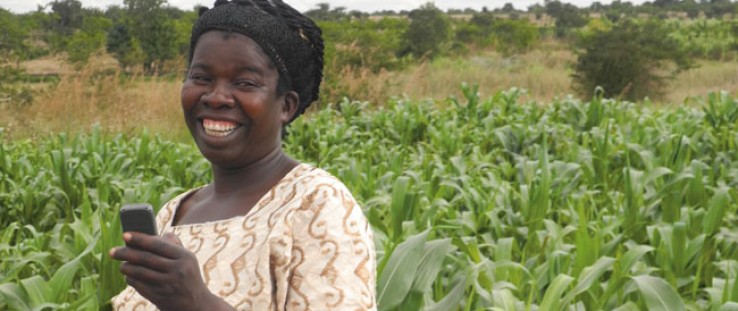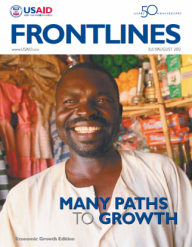 Sara Maunda checks her cell phone for pricing information.
ACDI/VOCA, Malawi
Sara Maunda checks her cell phone for pricing information.
ACDI/VOCA, Malawi
 Sara Maunda checks her cell phone for pricing information.
ACDI/VOCA, Malawi
Sara Maunda checks her cell phone for pricing information.
ACDI/VOCA, Malawi
At the end of the year in Malawi, the “planting” rains arrive. Families get to work swinging hoes, clearing land, weeding and planting maize, beans, soy and tobacco. By March, if rainfall is sufficient, the parched landscape transforms into an emerald ocean of ripening crops that by mid-year are safely in store. This is when speculative grain traders arrive.
Farmers everywhere need cash to pay loans, school fees, medical bills and other expenses such as agricultural inputs. Traders know this and rural farmers usually succumb, selling their crops well below market value. Later, traders sell these grains in bulk, posting significant profits for themselves.
Challenging this system that leaves farmers with little profit has been difficult without access to widespread, reliable market information and alternative outlets. Modern cellular communications and widespread cell phone ownership, however, are beginning to provide windows of opportunity across Africa. Texting has exploded in many African countries as an important tool that bypasses lack of traditional infrastructure and links providers of products and services to their customers.
Sara Maunda is one of a growing number of farmers doing just that— taking charge of marketing their own crops and keeping more profit for themselves with the help of market information. With training from USAID/Malawi’s Market Linkages Initiative, she registered to receive regular market information updates on her cell phone from Esoko, a Ghanaian company with a franchise in Malawi. The “E” stands for electronic, and soko is Swahili for market.
USAID/Malawi started the project with Esoko in 2011 to equip farmers, who have little bargaining power, with a tool that provides them with current market information, which helps them to receive a fairer price for their crops. Currently, the Market Linkages Initiative uses Esoko to collect prices from markets around Malawi. Local enumerators upload prices onto the system via their cell phones and, after approval, the prices are automatically sent out to registered users via SMS. To date, the service has been provided free of charge by the project. Starting in July 2012, the Agricultural Commodities Exchange for Africa (ACE) will take over Esoko price alerts commercially.
Five Times the Vendor’s Offer
So far, the mobile messages have provided farmers information they needed to sell 2,500 metric tons of grain valued at $750,000—with much more expected from 2012’s harvest. Maunda was one of those farmers who reaped the benefits from receiving an Esoko text. Her story illustrates the value that timely information can have.
“In June 2011, a grain trader arrived at my gate offering me 30 kwacha per kilo for my peanuts,” Maunda said. “My SMS from Esoko told me that the price was more than four times the trader’s price. When I showed him, he said, ‘These people are lying to you—you will go very far and find that you have lost money.’”
Maunda trusted both her instincts and the text messages. She and four neighbors rented a pick-up truck in Madisi, the nearest town, and headed south to Lilongwe, 80 kilometers away, to sell their groundnut crop themselves.
“The market price there was five times the vendor’s offer. My share of the sale cleared 24,000 kwacha ($130) after all expenses. If I had sold to the vendor at my village I would have made only 4,500 kwacha ($27),” she said.
Agriculture is the driver of the Malawian economy, fueled largely by poor smallholder farmers. With the steady decline of tobacco production, the main cash crop and export earner, alternative crops are needed to drive future growth. Like so many countries, Malawi also has to grapple with the challenges of a degrading natural resource base, climate change, a growing population, widespread poverty, undernutrition and disease.
“ACE offers a structured and transparent place where traders big and small can interact and access markets on a more level, fair and open playing field,” says Cybil Sigler, economic growth team leader at USAID’s mission in Malawi. In the larger scheme of things, ACE and the Market Linkages Initiative support Malawi’s Feed the Future strategy by linking smallholder farmers to markets that will eventually lead to improved quality and higher prices for the produce they sell.
Crop as Collateral
In July 2012, when ACE agents begin collecting market information from 17 markets across Malawi, they will also advertise “warehouse receipts” to farmers and farmer organizations. The new product will allow farmers to deposit their crops into storage and use them as collateral to access financing. Farmers will also take advantage of higher prices for their crops later in the season when the market is not flush from the harvest. As ACE expands and more households begin to use such services, incomes are expected to follow suit.









Comment
Make a general inquiry or suggest an improvement.